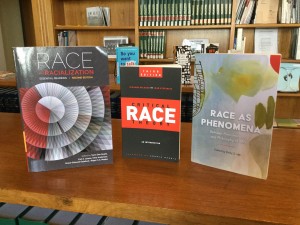- Three new books on Critical Race theory have been added to the Ramsey County Law Library.
Critical Race Theory (or CRT) is defined by Britannica as “the view that the law and legal institutions are inherently racist and that race itself, instead of being biologically grounded and natural, is a socially constructed concept that is used by white people to further their economic and political interests at the expense of people of colour.”
This week’s blog features two books about CRT. They are scholarly works that offer a deep dive into the topic. These rigorous studies of CRT provide a “radical and challenging perspective that reveals how racism shapes the everyday reality of the world; from law courts and prisons, to the economy, schools, media, and health care.” (David Gillborn, Professor, University of Birmingham, UK)
Critical Race Theory: An Introduction by Richard Delgado and Jean Stefancic, (New York University Press, 2017), describes CRT as comprising activists and scholars who question the foundations of the liberal order, including equality theory and neutral principles of constitutional law. Seen as fostering a movement, CRT builds on previous movements (critical legal studies and radical feminism). The book gives an introductory overview that includes criticism from both the left and the right.
Another book that the law library has on CRT is called Race and Racialization: Essential Readings. The second edition of this title was published in 2018 and is a collection of scholarly essays describing race and how racial tensions intersect with gender, economic status, ethnicity, and sexuality. The essays are not limited to views from the United States, and in fact, many of the pieces describe these issues occurring in Canada and other countries to show that difficulties with racism are not unique to the United States.
The book is organized by sections, each dealing with a different perspective on racism: colonialism, institutional racism, ethnocentrism, privilege, marginalization, and resistance. The essays span decades of research and discussion on race. The first essay in the book, which proposes that racism is not biologically inherent in people but is a learned behavior, was written in 1931. The essays at the end of the book are much more current as the last essay examines the origins of the Black Lives Matter movement in Toronto.
This week’s blog also features a scholarly work that examines the philosophy of race and race as phenomena. Race as Phenomena: Between Phenomenology and Philosophy of Race is edited by Emily S. Lee (Rowman & Littlefield, 2019). The book is a collection of intellectual, well-researched essays that are written by important contributors to the field. The essays “examine persistent questions within philosophy of race, from how to conceptualize race to the lived experience of blackness and whiteness.” (Introduction) The work includes essays that describe race consciousness as phenomenologically understood, the black body and the phenomenology of being stopped, and seeing like a cop.
These books are available at the Ramsey County Law Library.
Richard Delgado and Jean Stefancic, Critical Race Theory (Third Edition): An Introduction, New York: NYU Press, 2017.
Race and Racialization: Essential Readings, 2nd Edition, Tania Das Gupta, Carl E James, Chris Andersen eds., Toronto: Canadian Scholars, 2018.
Race as Phenomena: Between Phenomenology and Philosophy of Race, Emily S. Lee, ed., Rowman & Littlefield, 2019.
